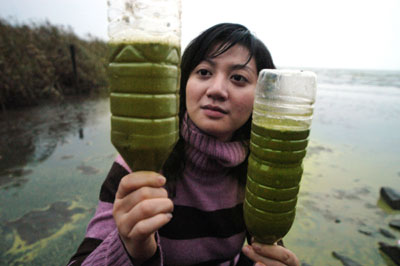One morning this summer, residents of Wuxi City, in China's eastern Jiangsu Province, awoke to find their beloved Taihu Lake had turned rancid. The water was filled with a bloom of blue-green algae that gave off a rotten smell. The water was tested to be undrinkable.
For almost three decades, the city had welcomed some of the world's biggest polluters to settle there. Churning out paper, photographic film, dye, fertilizer, cement and other products for the global marketplace, the businesses helped make Wuxi into one of the country's wealthiest industrial cities.
A woman holds two bottles of blue-green algae polluted water sampled from Taihu Basin's Huzhou section on November 22, 2006. Polluting discharges poisoned Jiangsu Province's vast network of lakes, rivers and canals.
However, these firms also poisoned the province's vast network of lakes, rivers and canals. In late May, when the toxic sludge reached Taihu Lake, which is the main source of potable water for Wuxi's 5.8 million residents, people turned on their taps and got only sludge.
City officials decided they'd had enough. In a series of radical proclamations that sent shudders though the business community, Wuxi declared itself a newly reformed "green city", the Washington Post reported on its Saturday edition.
By the end of September, the city had closed or given directives to close more than 1,340 polluting factories. Wuxi ordered the rest to clean up by coming June or be permanently shut down.
The actions were applauded by Premier Wen Jiabao, who has vowed to use economic incentives and punishments to aid in environmental protection and resource protection. Last week, the State Council, which Premier Wen heads, approved an environmental plan that includes reducing major pollutant discharges by 10 percent by 2010, a formidable challenge facing the government but not a target unattainable, analysts said.
Plagued by worsening water shortage, choking on dusty air and alarmed by a sharp rise in pollution-related diseases and deaths, China has been searching for years for a way to fix its environment without hurting its economy.
The Washington Post report quoted Elizabeth Economy, a fellow at the Council on Foreign Relations and author of "The River Runs Black: The Environmental Challenges to China's Future," as saying that, this time "the commitment, the profile, the energy behind Beijing's environmental protection efforts far exceeds anything we've seen in China's history.
"It's not about new ideas, but about enforcement. . . . What is changing are the incentives or disincentives, " Economy told the Washington Post.
In 2007, some Chinese cities are taking measures that show that their officials are beginning to make the environment a higher priority than raising their GDP, a fundamental shift in thinking for a country that can attribute much of its early-stage development to being the place to which others outsourced their pollution, the Washington Post report said.
And, the State Environmental Protection Administration (SEPA), a cabinet ministry of the State Council, now is empowered with more teeth. It has armed local governments with new tools for punishing polluters. Chinese banks now have the right to deny loans to polluting companies, which are on SPEA's polluters blacklist.
And, SEPA officials are able to force violators to issue humiliating public apologies in newspapers or television announcements detailing their crimes. Also, utility companies are empowered to raise electricity, gas or water rates for companies that consume too many resources.
The result has been devastating for a growing number of companies, the Washington Post reported.
In Heilongjiang Province in the northeast, officials have announced that they had kicked out 100 polluting enterprises that were sending industrial runoff into a river that empties in Russia. In Shanxi Province, China's largest coal-mining area, officials have closed down most industry in a county whose outdated machinery polluted waterways. And in Inner Mongolia, the government closed a production facility for one of China's biggest companies, Mengniu Dairy, because it had been operating without wastewater processing facilities and discharging waste into the Yellow River.
Ventures that are fully or partly owned by foreigners have also been caught in the inspections. This month, Unilever China, which makes soap, shampoo and other cleaners, was fined and ordered to reduce production because of excessive discharges.
Liu Yamin, chief of Wuxi's Environmental Protection Bureau, acknowledged that as the city transforms itself from dependence on industry to a focus on high-tech research, there will be growing pains.
"The blue-green algae gave us a warning, a shock, but we Chinese have a saying that a bad thing can be turned into a good thing," Liu said.
Businesses say that the environmental measures are good in theory but that they worry about unemployment and whether the laws are being applied fairly.
Wuxi Dongtai Fine Chemical Industry was fined US$13,000 and ordered to stop making one of its products for failing to meet environmental standards. The city said Dongtai leaked chemicals into a river that flows into Tai Lake.
Feng Jing, Dongtai's office manger, said the incident was minor, caused by small cracks in its piping system, but that the punishment was severe. As a result, the company laid off 50 of its 600 workers.
Feng Jing told the Washington Post reporter that worse offenders are still operating.
"As a civilian, I cannot say that current measures taken by the government are wrong . . . but the government really has gone a little too far," Feng said.
Wang Guoxiang, director of the Research Center for Eco-Environmental Sciences at Nanjing Normal University in Jiangsu Province, said government engineers tried every scientific alternative possible, spending US$1.3 billion to try to save Taihu Lake. They dug up the silt and replaced it. They poured fresh water into the lake and redirected rivers to try to wash the pollution away. They even seeded clouds to create rain to dilute the polluted water.
But it took an algae crisis to force the government to start closing companies.
(China Daily October 8, 2007)






